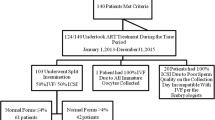Abstract
Purpose
To reevaluate the effect of isolated teratozoospermia on IVF and determine if there was any therapeutic benefit to isolated teratozoospermia by ICSI, since there are no widely accepted criteria for the treatment technique about isolated teratozoospermia.
Methods
A total of 441 couples with >20 million and progressive motility >30 % sperm undergoing their first IVF/ICSI cycle were included in the study between 2008 and 2010, for whom at least 8 oocytes were retrived. Isolated teratozoospermia was diagnosed in 183 of the included couples, and the rest couples (normal sperm morphology) were studied as control. Sibling oocytes were randomized to be inseminated either by ICSI or IVF. Fertilization rate, embryo quality, pregnancy rate, implantation rate and spontaneous abortion rate were assessed.
Results
There was no difference in the percentage of eggs fertilized, implantation rate, pregnancy rate and spontaneous abortion rate between conventional IVF and ICSI regardless of the percentage of normal morphology. The day 3 embryonic morphology and rate of development were not different despite the insemination method and percentage of normal morphology.
Conclusion
Because isolated teratozoospermia did not influence the major indices of IVF and the unnecessary use of ICSI is time-consuming, costly and potential risks, couples with isolated teratozoospermia need not be subjected to ICSI.
Similar content being viewed by others
References
Vawda AI, Gunby J, Younglai V. Semen parameters as predictors of in-vitro fertilization: the importance of strict criteria sperm morphology. Hum Reprod. 1996;11:1445–50.
Dubey A, Dayal MB, Frankfurter D, Balazy P, Peak D, Gindoff PR. The influence of sperm morphology on preimplantation genetic diagnosis cycles outcome. Fertil Steril. 2008;89:1665–9.
Lundin K, Soderlund B, Hamberger L. The relationship between sperm morphology and rates of fertilization, pregnancy and spontaneous abortion in an in-vitro fertilization/intracytoplasmic sperm injection programme. Hum Reprod. 1997;12:2676–81.
Robinson JN, Lockwood GM, Dokras A, Egan DM, Nicholson SC, Ross C, et al. Does isolated teratozoospermia affect performance in in-vitro fertilization and embryo transfer? Hum Reprod. 1994;9:870–4.
Yue Z, Meng FJ, Jorgensen N, Ziebe S, Andersen AN. Sperm morphology using strict cri-teria after Percoll density separation: influence on cleavage and pregnancy rates after in-vitro fertilization. Hum Reprod. 1995;10:1781–5.
Cowan DB, Santis M, Keefe T, Hargreaves CA, Howell RJS, Homa ST. A bridge to intra-cytoplasmic sperm injection-high insemination concentrations benefit patients who have a reduced chance of fertilization with standard in-vitro fertilization. Hum Reprod. 1996;11:1985–9.
Dumoulin JCM, Coonen E, Bras M, Bergers-Janssen JM, Ignoul-Vanvuchelen RCM, van Wissen LCP, et al. Embryo development and chromosomal anomalies after ICSI: effect of the injection procedure. Hum Reprod. 2001;16:306–12.
Schnorr J, Brown S, Oehninger S, Mayer J, Muasher S, Lanzendorf S. Impact of intracytoplasmic sperm injection on embryo cryopreservation and clinical outcome. Fertil Steril. 2001;75(3):636–7.
Macas E, Imthurn B, Borsos M, Rosselli M, Maurer-Major E, Keller PJ. Impairment of the developmental potential of frozen-thawed human zygotes obtained after intracytoplasmic sperm injection. Fertil Steril. 1998;69(4):630–5.
Wennerholm UB, Bergh C, Hamberger L, Lundin K, Nilsson L, Wikland M, et al. Incidence of congenital malformations in children born after ICSI. Hum Reprod. 2000;15:944–8.
Chang PL, Sauer MV, Brown SY. Chromosome microdeletion in a father and his four infertile sons. Hum Reprod. 1999;14:2689–94.
World Health Organization. WHO laboratory manual for the examination of human semen and semen–cervical mucus interaction. 4th ed. Cambridge: Cambridge University Press; 1999.
Tournaye H, Verheyen G, Albano C, Camus M, Van Landuyt L, Devroey P, et al. Intracytoplasmic sperm injection versus in vitro fertilization: a randomized controlled trial and a meta-analysis of the literature. Fertil Steril. 2002;78:1030–7.
Hwang JL, Seow KM, Lin YH, Hsieh BC, Huang LW, Chen HJ, et al. IVF versus ICSI in sibling oocytes from patients with polycystic ovarian syndrome: a randomized controlled trial. Hum Reprod. 2005;20(5):1261–5.
Coetzee K, Kruge TF, Lombard CJ. Predictive value of normal sperm morphology: a structured literature review. Hum Reprod Update. 1998;4:73–82.
Osawa Y, Sueoka K, Iwata S, Shinohara M, Kobayashi N, Kuji N, et al. Assessment of the dominant abnormal form is useful for predicting the outcome of intracytoplasmic sperm injection in the case of severe teratozoospermia. J Assist Reprod Genet. 1999;16:436–42.
Keegan BR, Barton S, Sanchez X, Berkeley AS, Krey LC, Grifo J. Isolated teratozoospermia does not affect in vitro fertilization outcome and is not an indication for intracytoplasmic sperm injection. Fertil Steril. 2007;88(6):1583–8.
Parinaud J, Mieusset R, Vieitez G, Labal B, Richoilley G. Influence of sperm parameters on embryo quality. Fertil Steril. 1993;60(5):888–92.
Terriou P, Giorgetti C, Auquier P, Hans E, Spach JL, Salzmann J, et al. Teratozoospermia influences fertilization rate in vitro but not embryo quality. Hum Reprod. 1997;12:1069–72.
Cohen J, Alikani M, Munne S, Palermo G. Micromanipulation in clinical management of fertility disorders. Semin Reprod Endocrinol. 1994;12:151–6.
Mansour RT, Aboulghar MA, Serour GI, Amin YM, Ramzi AM. The effect of sperm parameters on the outcome of intracytoplasmic sperm injection. Fertil Steril. 1995;64:982–6.
Braude BV, Moore S. Human gene expression first occurs between the four- and eight-cell stage of preimplantaion development. Nature. 1988;332:459–61.
Ahmadi A, Ng SC. Fertilizing ability of DNA-damaged spermatozoa. J Exp Zool. 1999;284:696–704.
O’Brien J, Zini A. Sperm DNA integrity and male infertility. Urology. 2005;65:16–22.
Hotaling JM, Smith JF, Rosen M, Muller CH, Walsh TJ. The relationship between isolated teratozoospermia and clinical pregnancy after in vitro fertilization with or without intracytoplasmic sperm injection: a systematic review and meta-analysis. Fertil Steril. 2011;95:1141–5.
Acknowledgements
The authors wish to thank the staff of the reproductive center of the West China Second University Hospital for their contribution.
Author information
Authors and Affiliations
Corresponding author
Additional information
Capsule
Retrospective analysis of outcome of conventional IVF and ICSI on sibling oocytes found that in couples with isolated teratozoospermia, there may be no therapeutic benefit to ICSI.
Rights and permissions
About this article
Cite this article
Fan, W., wei Li, S., Li, L. et al. Outcome of conventional IVF and ICSI on sibling oocytes in the case of isolated teratozoospermia. J Assist Reprod Genet 29, 905–910 (2012). https://doi.org/10.1007/s10815-012-9823-x
Received:
Accepted:
Published:
Issue Date:
DOI: https://doi.org/10.1007/s10815-012-9823-x




